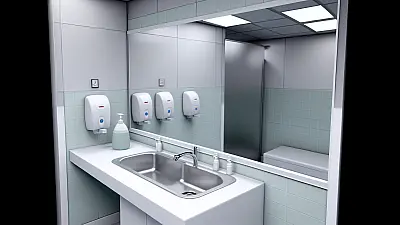TOPEKA, KS - Plaza West Healthcare and Rehab was cited by state inspectors for failing to maintain adequate infection control measures, putting residents at risk for communicable diseases and infections during a March 19, 2025 complaint investigation.

Infection Control Deficiencies Documented
The facility received a citation under federal regulation F849, which requires nursing homes to provide a safe, sanitary environment that prevents the development and transmission of communicable diseases and infections. This regulation serves as a cornerstone of resident safety in long-term care facilities.
Infection control failures in nursing homes can have devastating consequences for vulnerable elderly residents. When facilities fail to maintain proper sanitary conditions, residents face increased risks of developing serious infections including pneumonia, urinary tract infections, skin infections, and potentially life-threatening sepsis.
Medical Significance of Infection Control
Proper infection control protocols are critical in nursing home settings because residents typically have compromised immune systems due to age, chronic conditions, and medications. The elderly population is particularly susceptible to infections, with even minor breaches in sanitary practices potentially leading to serious health complications.
Healthcare facilities must maintain strict protocols including proper hand hygiene, environmental cleaning, isolation procedures for infectious residents, and appropriate use of personal protective equipment. These measures form multiple barriers against disease transmission.
When infection control systems fail, pathogens can spread rapidly through a facility. Respiratory infections can transmit through airborne droplets, while surface contamination can spread gastrointestinal illnesses and antibiotic-resistant bacteria. Proper environmental sanitation removes these disease-causing organisms before they can infect vulnerable residents.
Industry Standards for Infection Prevention
Federal regulations require nursing homes to establish and maintain comprehensive infection prevention and control programs. These programs must include ongoing surveillance for infections, immediate implementation of control measures when infections are identified, and staff training on proper hygiene practices.
Facilities should conduct regular environmental assessments, maintain proper ventilation systems, ensure adequate supplies of cleaning materials and personal protective equipment, and establish clear protocols for managing infectious residents. Regular monitoring and documentation of these activities helps ensure consistent implementation.
The Centers for Disease Control and Prevention provides detailed guidelines for infection control in long-term care facilities, emphasizing the importance of a systematic approach to preventing disease transmission. These evidence-based practices have proven effective in reducing infection rates when properly implemented.
Health Risks to Residents
Inadequate infection control can lead to healthcare-associated infections, which affect millions of nursing home residents annually. These infections can cause prolonged illness, increased medical complications, extended hospitalizations, and in severe cases, death.
Common infections in nursing homes include pneumonia, which can be particularly dangerous for elderly residents with existing respiratory conditions, and urinary tract infections, which can progress to kidney infections or sepsis if not properly managed. Skin and wound infections can also develop when proper hygiene and wound care protocols are not followed.
Residents with compromised immune systems, diabetes, or other chronic conditions face even greater risks when exposed to infectious agents in unsanitary environments.
Regulatory Response
The F849 citation indicates inspectors found specific deficiencies in the facility's infection control practices during their investigation. This federal tag carries significant regulatory weight, as infection control violations can lead to additional oversight, corrective action requirements, and potential financial penalties.
Nursing homes must develop and implement corrective action plans to address identified deficiencies and demonstrate sustained compliance with infection control standards to maintain their certification and continue serving Medicare and Medicaid residents.
Full Inspection Report
The details above represent a summary of key findings. View the complete inspection report for Plaza West Healthcare and Rehab from 2025-03-19 including all violations, facility responses, and corrective action plans.
💬 Join the Discussion
Comments are moderated. Please keep discussions respectful and relevant to nursing home care quality.